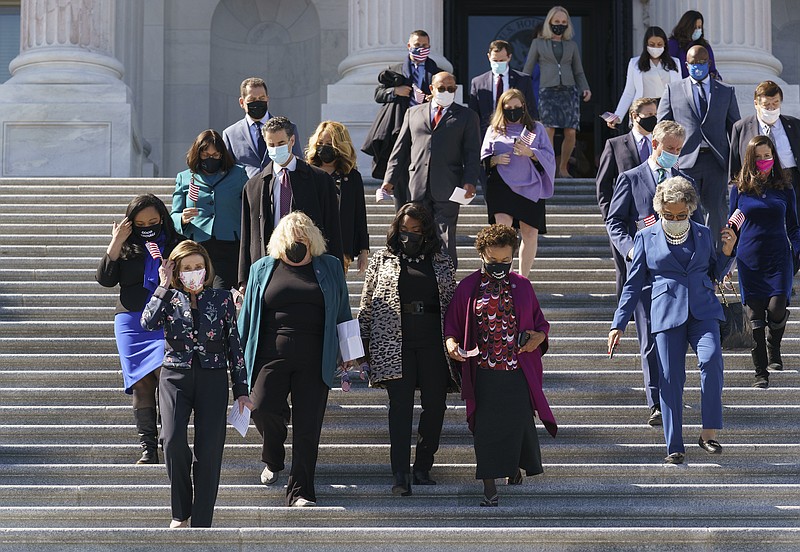Tennessee Republican leaders are criticizing the U.S. House of Representatives for its effort to change voting laws in an effort to bring more people into the election process and overhaul the method for redrawing boundary lines for representation.
On a party-line 220-210 vote, the House on Wednesday passed wide-ranging voting and ethics legislation. The measure faces a higher hurdle in the Senate, which is split 50-50 between Democrats and Republicans, where it requires 60 votes to avoid a filibuster.
Tennessee House Speaker Cameron Sexton accused "progressive liberals" in Washington of putting their agenda first.
"They're trying to change the election law for political reasons, not even because they think it's best," Sexton said Thursday. "They're wanting to take away the states' rights, and I think they need to remember that the states are the ones that put them in power."
The Crossville Republican predicted numerous states would file lawsuits to stop the legislation from taking effect if it somehow passes the Senate.
House Republican Caucus Chairman Jeremy Faison echoed Sexton, saying Congress needs to be reminded the nation has "50 individual elections." He surmised President Joe Biden was elected only because of those "50 individual elections," though Biden won the popular vote overwhelmingly as well as the Electoral College.
"They're trying to consolidate power and have a national election, and that is so dangerous moving forward for our country. There is nothing good or wholesome about that notion of having a national election," said Faison, a Cosby Republican from East Tennessee.
Among other things, the bill would require states to enact automatic registration for eligible voters and offer same-day registration, two steps Tennessee Democrats have tried to take for years. The bill also would expand absentee balloting dramatically by allowing voters to mail in ballots without using one of about 12 excuses allowed in the state.
Congressional For the People Act 2021
> Expands access to voter registration, including a provision for same-day registration.> Provides for restoration of voting rights for felons.> Prohibits campaign spending by foreign nationals.> Requires states to establish independent panels for redistricting of congressional seats.> Requires the president, vice president and candidates for those offices to disclose 10 years of tax returns.
Absentee balloting amid the COVID-19 pandemic led to a 2020 lawsuit by Nashville and Memphis voters who contended the state should widen mail-in ballots to those afraid of catching the virus.
House Republicans are trying to remove Davidson County Chancellor Ellen Hobbs Lyle because she initially ruled against the state. The Attorney General's Office shifted its argument just before the case went before the Tennessee Supreme Court and agreed that people with underlying health conditions, as well as their caregivers, could vote absentee. The high court, though, overruled Lyle's decision that all eligible voters could vote absentee because of fear of COVID-19.
An effort to oust Lyle has not been filed in the Senate. And Lt. Gov. Randy McNally said Thursday if a resolution is brought in the Senate, "it would not be a slam dunk."
Nevertheless, McNally said he would be "disappointed" to see the sweeping changes pass Congress.
"In the past it's been up to the legislature to determine how elections are run," said McNally, an Oak Ridge Republican. He termed such action "micromanaging."
During a Thursday press conference, Sen. Mike Bell, chairman of the Senate Judiciary Committee, added, "The last thing my constituents want is a dysfunctional federal government taking over elections."
Besides outrage over Chancellor Lyle, a Tennessee Republican senator is sponsoring a bill to end early voting in an effort to tamp down on alleged fraud. Republicans nationwide are pushing legislation to quell early voting and absentee ballots amid former President Trump's claims of widespread voter fraud - claims that have been rejected by the states, courts and Congress.
The congressional bill, in contrast, would cut back on state purges of registered voters, force the restoration of former felons' voting rights and require 15 days of early voting.
In addition, it would mandate the creation of nonpartisan commissions to redraw congressional district boundaries, rather than leaving that task to state legislatures and the potential for gerrymandering.
Senate Minority Leader Jeff Yarbro, a Nashville Democrat, contends the nation has had a "street fight" over the rules of elections in every campaign since the Bush vs. Gore election in 2000. He said election rules shouldn't determine who governs.
"They ought to be decided by the voters who are operating under rules that just make sense and make it easy for people to exercise their constitutional right to vote and participate in self-government," Yarbro said Thursday in an online news conference.
Democrats have pointed out for several years that Tennessee has one of the lowest voter participation rates in the nation but have made little, if any, headway to increase turnout through legislative action.
State Sen. Raumesh Akbari, chair of the Senate Democratic Caucus, said not only should Congress pass this bill, it should restore the Voting Rights Act to expand "the pathway" for people to exercise their voting rights.
While Republicans claim automatic voter registration and expanded absentee voting will lead to more fraud, Akbari said there is no evidence to support the allegation.
"The only thing it's actually led to is more people participating in the democratic process, which is what we all should want," said Akbari, a Memphis Democrat.
Democrats have a raft of voting bills this year dealing with everything from identity theft on registrations, efforts to bolster registration, increasing voter-verifiable paper trails, allowing college photo identifications to be used for voting in person, make it easier for felons' rights to be restored and removing politics from elections by reforming the state election commission and elections coordinator.
Battle lines drawn
Yarbro believes one of the most important reforms in the congressional bill involves the redrawing of district lines, which he says is "one of the biggest determinants" of the direction taken by the Tennessee Legislature.
Redistricting is supposed to take place by early January 2022, based on the 2020 Census results, which the federal government has not turned over to the state yet. The state is likely to get the data by September.
Typically, the majority party in the Legislature has control over redistricting and can draw the lines in a fashion to ensure its candidates have the best chance at winning, even putting incumbents in the same party into the same legislative district so they would have to run against each other or move.
"There's lots of ways the Tennessee General Assembly doesn't actually represent the voters of Tennessee because the lines are drawn to very much ensure what the outcomes are going to be on Election Day," Yarbro said.
Sexton and Faison, though, argue the effort to change the redistricting process is "all political," an effort by congressional Democrats to stay in power. Faison, in fact, says Tennessee hasn't gotten its census numbers yet because Democrats are trying to figure out how to save their seats.
"This is something that has been precedent from the beginning. They're monkeying with stuff they don't need to," Faison said.
While Democrats have a majority on a national scale, seven members of Tennessee's congressional delegation are Republicans, and two are Democrats, Rep. Steve Cohen of Memphis and Rep. Jim Cooper of Nashville.

